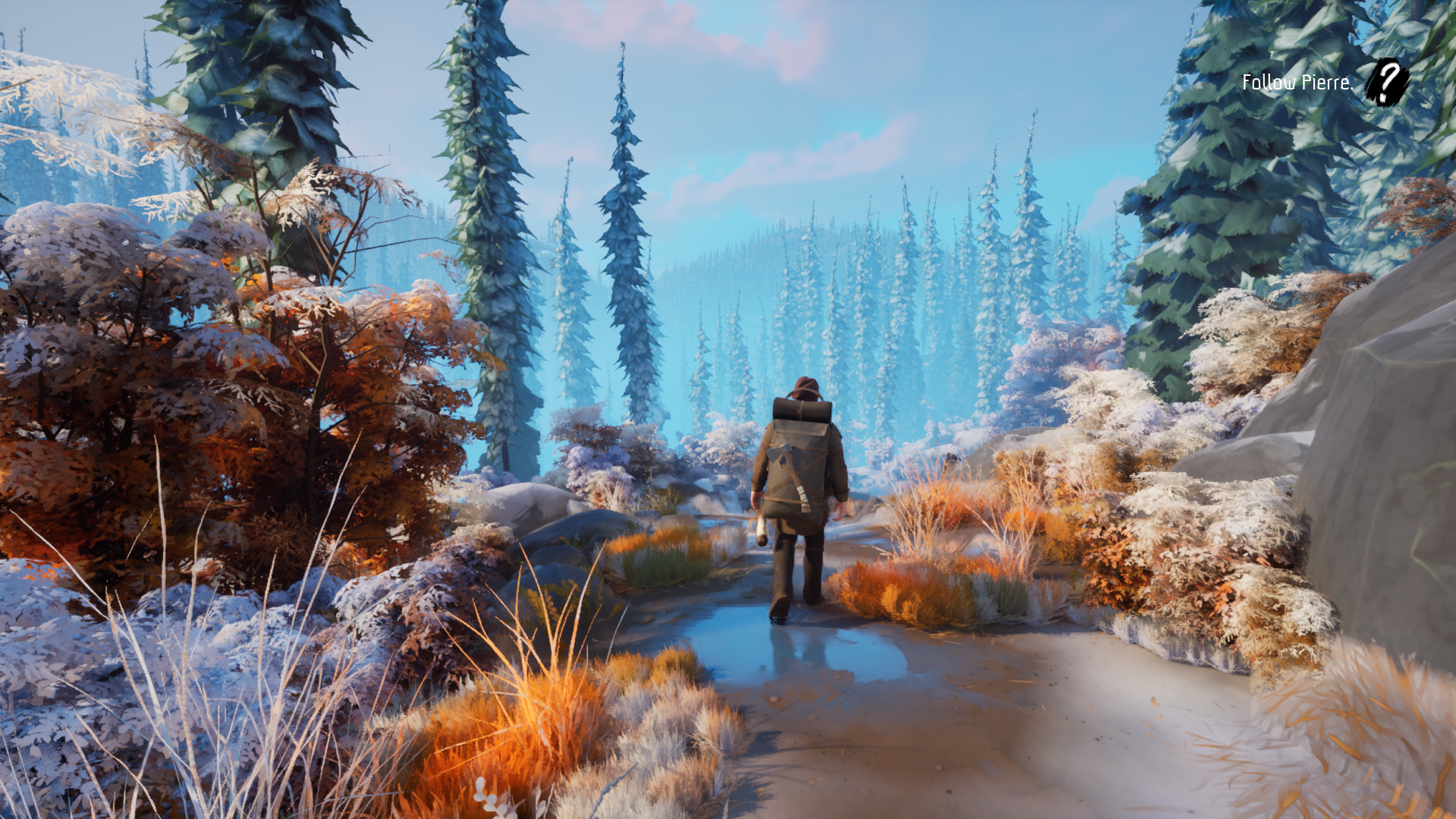
Two Falls (Nishu Takuatshina) Review
Two Falls (Nishu Takuatshina) doesn’t shy away from the messiness of history, while also approaching complicated subjects with compassion and empathy.
As we celebrate Native American Heritage Month here in the United States, the team at Unreliable Narrators brings us a complex and thoughtful perspective of Canada’s First Nations history, in their new release, Two Falls (Nishu Takuatshina). If your first question about the game is anything like mine, you’re wondering to what degree indigenous voices were represented in the game’s development. The answer is from beginning to end. I was delighted to learn that, from Isabelle Picard, the game’s writer (of Wendat heritage), to Awastoki (a Wendat 3D art studio), to consultation by the Nionwentsïo Office, indigenous creators and organizations were involved throughout the process.
Two Falls (Nishu Takuatshina), is a first-person, choices-matter narrative experience that delves into the historical context of early encounters between French settlers and Canada’s First Nations. It does this through the eyes of two protagonists. You play as both Maikan, a young Innu hunter on a quest to help his community, and Jeanne, a young woman who travels by boat from France and is shipwrecked on the coast.
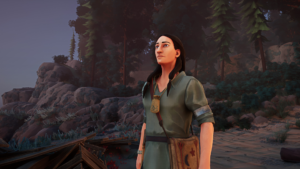
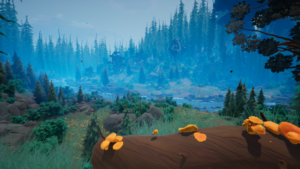
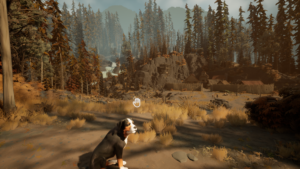
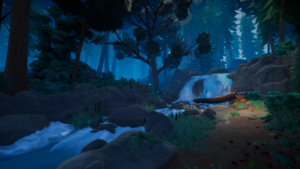
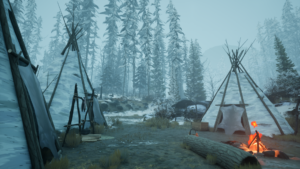
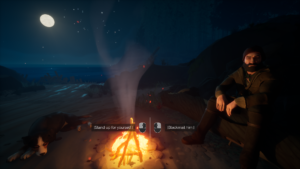
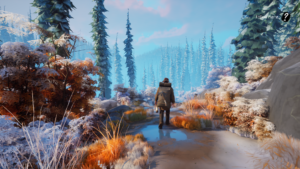
The gameplay experience was inspired, according to the developers, by Firewatch (2016) and What Remains of Edith Finch (2017). The narrative is divided into chapters and alternates between the two playable characters. Upon starting the game, I immediately felt the influence of Firewatch, especially during the scenes where you play as Maikan. The game is animated with a stylized realism similar to Firewatch. The forest you navigate absolutely comes alive through Maikan’s eyes, with vibrant colors and peaceful ambient noise. In contrast, Jeanne’s perspective of the same forest is grim and threatening. Her view of forest is painted dulled colors and shadows that may be obscuring threats at every turn. The designers did a remarkable job of conveying each protagonist’s perspectives through their relationship to the land.
Also akin to Firewatch, the narrative is shaped by the player’s dialogue choices, as each character. Personally, I really appreciated that the devs chose not to incorporate a timer and give the player as much time as they need to make a decision between dialogue options. This might be a play style thing, but personally I prefer to have this opportunity to think over my choices. I didn’t feel like the brief pauses harmed the fluidity of the scenes.
Another quality-of-life addition to the dialogue system is that decisions that influence the outcome of the game are labeled after the choice is made. Jeanne and Maikan both have two sliding scales that represent their personalities and alignments. These traits veer to one end or the other, according to the player’s decisions. Jeanne’s personal relationship to her Catholic faith, for example, can slide between dogmatic and liberating.
The world of Two Falls (Nishu Takuatshina) is populated with complicated characters, who are sometimes driven by compassion and integrity, sometimes driven by cruelty and fear, and whose motivations feel deeply authentic and familiar.
If I have any small gripe to make here, it’s that I think some of the dialogue previews that you have to choose between can be a little vague. I was occasionally surprised by the tone or full message that a character communicated based on my choice. And I get it, it’s hard to write preview text that’s fewer than 6 or 7 words, that fully encompasses the resulting statement. I think a label or color coding to show the characterization of the options would help to clarify the choices. But that might be a matter of taste, I’m sure some players enjoy the mystery of it all.
The world of Two Falls (Nishu Takuatshina) is populated with complicated characters, who are sometimes driven by compassion and integrity, sometimes driven by cruelty and fear, and whose motivations feel deeply authentic and familiar. Pierre, a French fur trader who begrudgingly agreed to help Jeanne get to Quebec, felt all too real at times. I could never quite tell if I should trust him or keep a wary eye on him.
Sometimes Pierre seemed sincere in his concern for Jeanne, and honorable in his commitment to escort her to safety. At others he seemed callous and dismissive of her precarious position. There were moments where I was almost touched at his openness to learn about Maikan’s culture and traditions, and the mutual respect they had built, only to get slapped in the face later by his prejudice and condescension towards Maikan. Most of the characters in Two Falls (Nishu Takuatshina) encompass a similar duality. The uncertainty I felt about each person’s true nature left me feeling suspicious at times, but also constantly curious to learn more about each one.
Maikan and Tehonwastasta were particularly impactful characters, who will stay with me for a long time. Maikan spends the game seeking out a solution to a mysterious climate event threatening the safety of his community. He is wary of the white settlers and (in my playthrough) looks to Tehonwastasta for wisdom in dealing with them. Tehonwastasta is a Wenhat translator and liaison with nearby colonial outposts and settlements, who is growing increasingly frustrated and tired in his attempts to gain respect and foster trust with the colonists.
Both characters are voiced by Indigenous voice actors: Maikan is played by Charles Bender, who is Wendat, and Tehonwastasta is played by James Malloch, a Mohawk voice actor. These actors brought life and heart to these deeply compelling characters. Maikan and Tehonwastasta, both leaders of their communities, grapple with questions of how to support and care for their people, while navigating uncertain relationships with the dubiously trustworthy white settlers. I found myself admiring them and their resolve, and sympathizing with them in their struggles to balance compassion with caution.
Two Falls (Nishu Takuatshina) poses questions of how we can bridge our divides. How can we collectively begin to heal and make ammends, when so much damage has already been done? When trust has become so broken? It answers these questions thoughtfully and realistically. It also answers this question with hope and empathy. These are deeply complicated challenges and this game doesn’t attempt to present simple solutions. What it does is set up a profoundly human story, backed by history, and put the tools in the hands of the players to seek out a way forward. And I respect the hell out of the team at Unreliable Narrators for that.
Get to the point, girl
Two Falls (Nishu Takuatshina) is a beautiful game that gives players a window into Canada’s complicated and sometimes tragic history. While there’s no sugar coating here, it does present its characters’ perspectives with compassion. Characters’ motivations are as complex as their circumstances, and players must decide who to protect and who to trust. There are some small tweaks to the choices-matter dialogue system, that I would personally advocate for. In general, I found the story gripping and the visual design and music both haunting and enchanting. I think this is a game that the world needs right now.
Emily’s Score: 8/10
Emily was provided with a review key of Two Falls (Nishu Takuatshina) by Unreliable Narrators
About No Small Games
No Small Games is an indie game recap and review podcast brought to you by hosts Kate and Emily! They became friends while streaming on Twitch and bonded over their love of indie video games. In each episode of No Small Games, the two will discuss an indie game they both played independently. They’ll compare their experiences: the good, the bad, their most memorable moments of their playthroughs.
Learn more about the podcast and its hosts on the About page.


